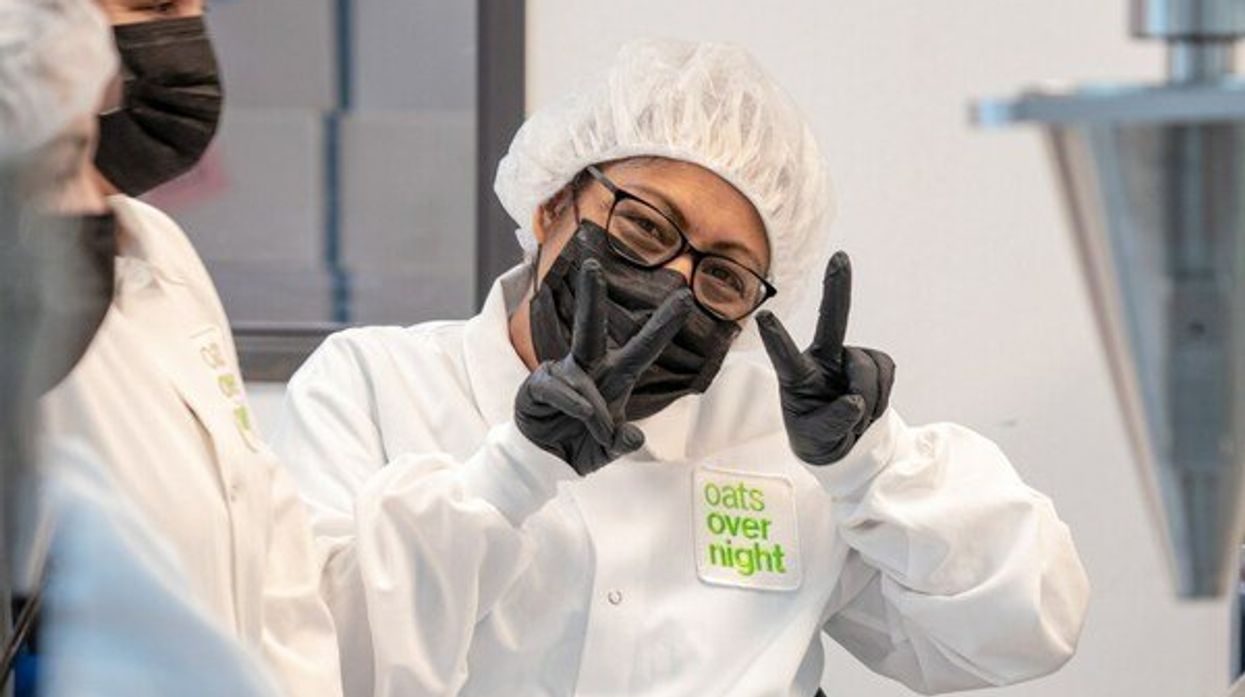Brand News
06 March 2023
Better-for-you snacks, grocery fulfillment robots raise funding
Dealboard has investment updates from Oats Overnight, BelliWelli, Poppy and more.

Fulfil Solutions' grocery fulfillment robots (Courtesy photo)
Dealboard has investment updates from Oats Overnight, BelliWelli, Poppy and more.

Fulfil Solutions' grocery fulfillment robots (Courtesy photo)
Welcome to Dealboard. In this weekly feature, The Current is providing a look at the mergers, acquisitions and venture capital deals making waves in ecommerce, CPG and retail.
This week, a group of brands in better-for-you snacks and staples raised new venture capital for expansion. Meanwhile, innovation in grocery fulfillment, apparel recycling and digitization of physical goods received new funding.

The Oats Overnight production team. (Courtesy photo)
Oats Overnight, a high-protein oatmeal brand, raised more than $20 million in a Series A round. Oats Overnight takes a social approach to R&D. Each month, it shares a new flavor with 100,000 active subscribers in its community. Now, the brand is at a gross revenue run rate of more than $100 million. With the funding, the brand plans to grow the sales team, and fund construction of a new 85,000-square-foot production and fulfillment center in Phoenix.
Participants in the financing included Singh Capital Partners, BFG Partners, Impatient Ventures, Watchfire Ventures, Morrison Seger Venture Capital Partners, Vanterra Ventures, Access Capital, Pure Ventures, and more
BelliWelli, a probiotic snack brand, raised $15.4 million in a Series A round, FoodBev Media reported. The Invus Group led the financing. The brand caters to people with gut health issues such as IBS. Bars are available in Sprouts, Hungry Root, Bristol Farms and Gelson’s Markets.
Immi, an instant ramen brand, raised $10 million in a Series A round. The financing was led by Touch Capital, with participation from celebrity investors including Naomi Osaka, Usher, Apolo Ohno, David Grutman, Kygo's Palm Tree Crew, and Gryffin. The brand sells across its website, Amazon and wholesale channels, as well as Whole Foods. Going forward, the brand plans to hire key leaders, add new flavors and expand retail doors.
Poppy Handcrafted Popcornraised $3 million in a Series A funding round. The funding was led by JACS Capital, the family office of former GE CEO Jeff Immelt. Led by Co-CEOs Susan Aplin and Ginger Frank, the Asheville, North Carolina-based brand plans to double existing manufacturing space with a $2 million investment in new equipment and technology. With the funding, Immelt is joining the brand’s advisory board, and Chris Renno will join the board of directors.
Fulfil Solutions, a robotics startup focused on online grocery fulfillment, emerged from stealth with $60 million in Series B funding. Eclipse led the financing, with participation from Khosla Ventures and DCVC. Fulfil recently opened an automated dark store with The Save Mart Companies in the San Francisco area that powers same-day grocery and pickup for the Lucky Now service.
Circ, a recycling tech company, raised $25 million in a Series B extension. Investors included European fashion platform Zalando, materials science company Avery Dennison and Korean manufacturer Youngone. Founded in 2011, Circ breaks down textiles using a hydrothermal process that allows them to turn into new products. The company previously raised $30 million in Series B funding from investors including Bill Gates-backed Breakthrough Energy Ventures and Zara parent Inditex.
Hexa, a 3D asset and visualization platform, raised $20.5 million in a Series A funding round. Investors included Point72 Ventures, Samurai Incubate, Sarona Partners and HTC. Hexa’s software is designed to create a 3D, interactive digital twin of a product that can be displayed on websites, social media and AR. Clients include Amazon, Macy’s and Crate & Barrel. "We are convinced 3D content will be at the heart of all online and offline retail," said Hexa CEO Yehiel Atias, in a statement.
Wella, a better-for-you foods manufacturer, acquired nutrition bar maker Thunderbird, Baking Business reported. Founded in 2010, Wella makes plant-based bars that are soy free, dairy free and gluten-free. The acquisition expands a copacking partnership signed between the two companies last year.
Campbell Soup Company CEO Mark Clouse offered thoughts on messaging amid inflationary shifts in consumer behavior.
After months of elevated inflation and interest rate hikes that have the potential to cool demand, consumers are showing more signs of shifting behavior.
It’s showing up in retail sales data, but there’s also evidence in the observations of the brands responsible for grocery store staples.
The latest example came this week from Campbell Soup Company. CEO Mark Clouse told analysts that the consumer continues to be “resilient” despite continued price increases on food, but found that “consumers are beginning to feel that pressure” as time goes on.
This shows up in the categories they are buying. Overall, Clouse said Campbell sees a shift toward shelf-stable items, and away from more expensive prepared foods.
There is also change in when they make purchases. People are buying more at the beginning of the month. That’s because they are stretching paychecks as long as possible.
These shifts change how the company is communicating with consumers.
Clouse said the changes in behavior are an opportunity to “focus on value within our messaging without necessarily having to chase pricing all the way down.”
“No question that it's important that we protect affordability and that we make that relevant in the categories that we're in," Clouse said. "But I also think there's a lot of ways to frame value in different ways, right?”
A meal cooked with condensed soup may be cheaper than picking up a frozen item or ordering out. Consumers just need a reminder. Even within Campbell’s own portfolio, the company can elevate brands that have more value now, even if they may not always get the limelight.
The open question is whether the shift in behavior will begin to show up in the results of the companies that have raised prices. Campbell’s overall net sales grew 5% for the quarter ended April 30, while gross profit margins held steady around 30%. But the category-level results were more uneven. U.S. soup sales declined 11%, though the company said that was owed to comparisons with the quarter when supply chains reopened a year ago and expressed confidence that the category is seeing a longer-term resurgence as more people cook at home following the pandemic. Snacks, which includes Goldfish and Pepperidge Farm, were up 12% And while net sales increased overall, the amount of products people are buying is declining. Volumes were down 7%.
These are trends happening across the grocery store. Campbell is continuing to compete. It is leading with iconic brands, and a host of different ways to consume them. It is following that up with innovation that makes the products stand out. Then, it is driving home messaging that shows consumers how to fit the products into their lives, and even their tightening spending plans.
Campbell Soup is more than 150 years old, and has seen plenty of difficult economic environments. It is also a different business today, and will continue to evolve. At the end of the day, continued execution is what’s required.
“If it's good food, people are going to buy it, especially if it's a great value,” Clouse said.